
Find Help
More Items From Ergsy search
-
Can lifestyle changes impact motor neurone disease progression?
Relevance: 100%
-

What is motor neurone disease?
Relevance: 83%
-
Is motor neurone disease hereditary?
Relevance: 80%
-
Are there different types of motor neurone disease?
Relevance: 80%
-
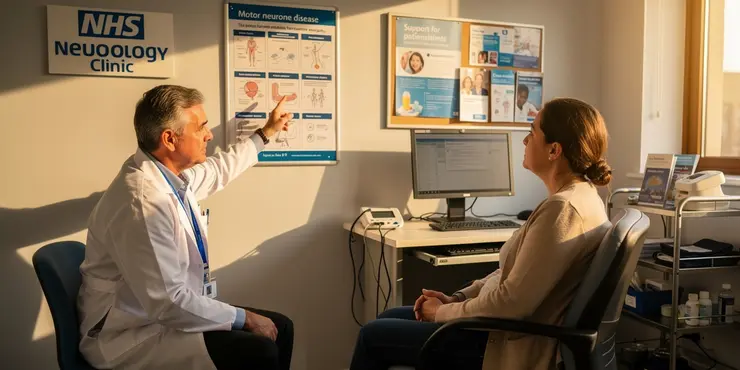
Is there a cure for motor neurone disease?
Relevance: 79%
-

What causes motor neurone disease?
Relevance: 78%
-

What are the primary symptoms of motor neurone disease?
Relevance: 76%
-
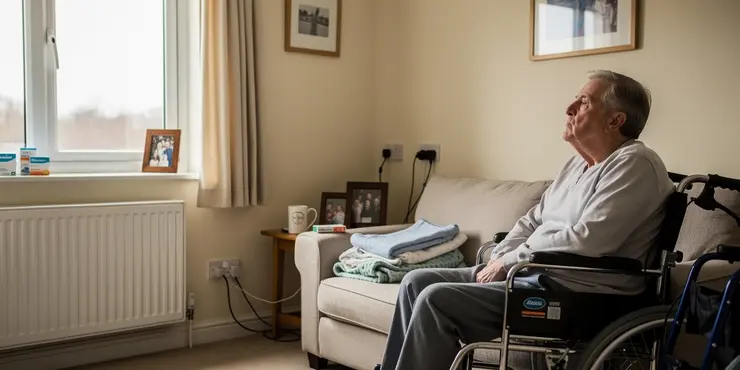
How is breathing affected by motor neurone disease?
Relevance: 72%
-

What treatments are available for motor neurone disease?
Relevance: 69%
-

Motor neurone disease Julie's story | NHS
Relevance: 69%
-
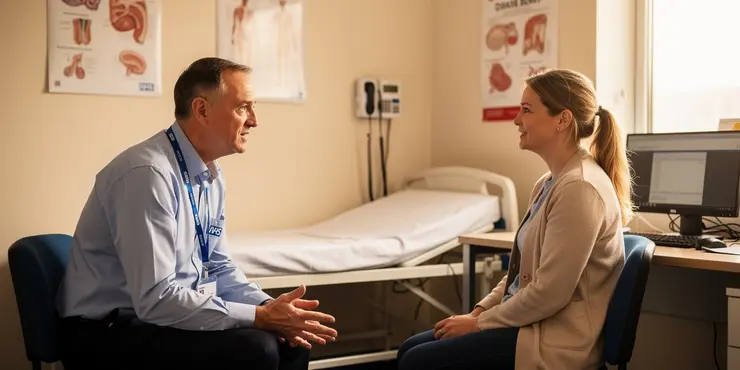
How is motor neurone disease diagnosed?
Relevance: 69%
-
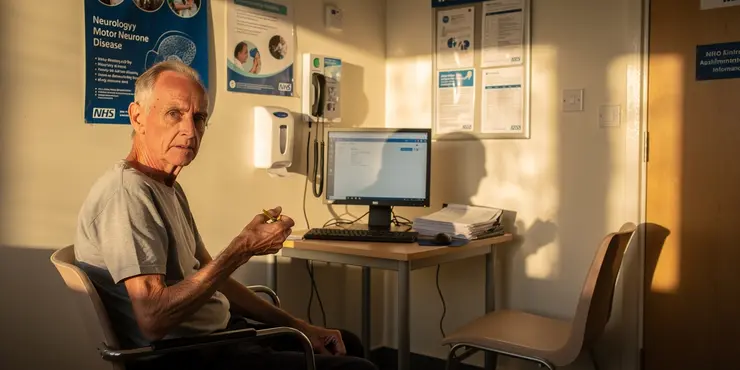
How does motor neurone disease affect the body?
Relevance: 69%
-

What role do genetics play in motor neurone disease?
Relevance: 69%
-
How does motor neurone disease affect speech?
Relevance: 68%
-
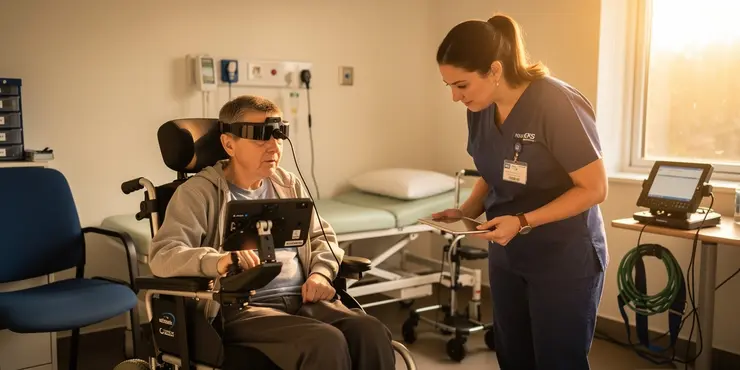
What assistive devices can help people with motor neurone disease?
Relevance: 67%
-
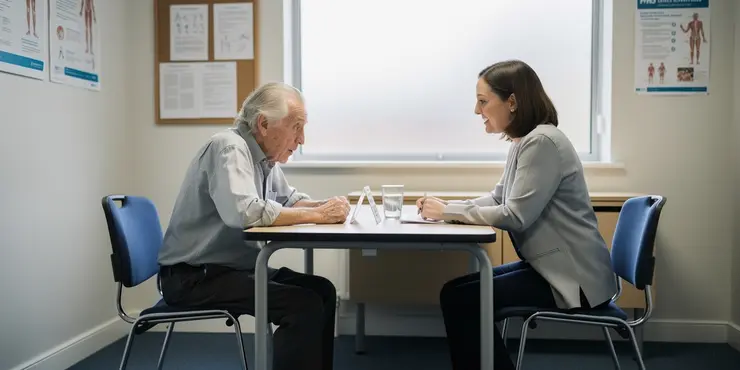
How does motor neurone disease impact swallowing?
Relevance: 65%
-

What is the life expectancy after a motor neurone disease diagnosis?
Relevance: 65%
-

Voice banking service helps people live with motor neurone disease
Relevance: 59%
-

How can caregivers support someone with motor neurone disease?
Relevance: 59%
-

Are there support groups for individuals with motor neurone disease?
Relevance: 50%
-
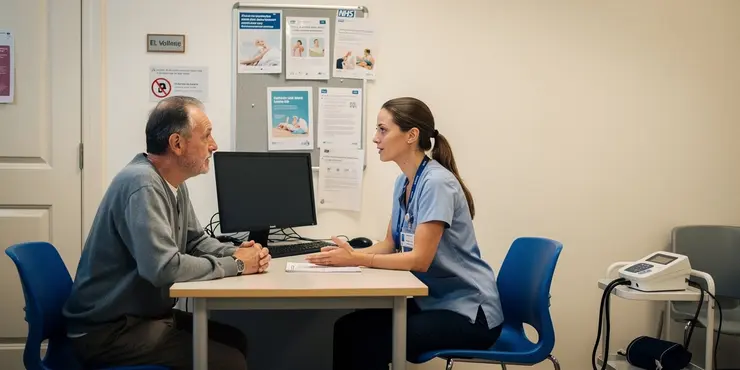
Who is at risk for motor neurone disease?
Relevance: 50%
-
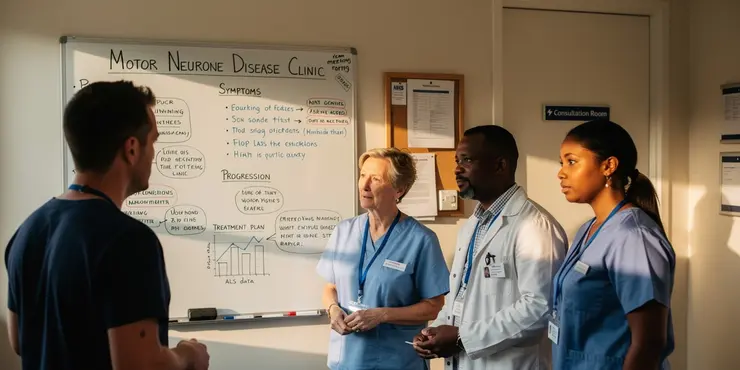
What research is being done on motor neurone disease?
Relevance: 50%
-

Can lifestyle changes help manage Huntington's disease?
Relevance: 41%
-

Can lifestyle changes reduce the need for medication for heart disease prevention?
Relevance: 40%
-

What is MND?
Relevance: 38%
-
What is Parkinson's disease?
Relevance: 38%
-
How does Huntington's disease affect movement?
Relevance: 38%
-
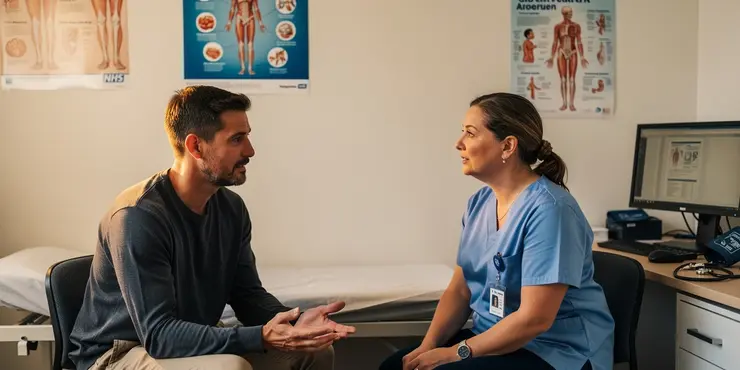
What causes Huntington's disease?
Relevance: 37%
-

Is Huntington's disease fatal?
Relevance: 34%
-
How quickly does flesh-eating disease progress?
Relevance: 33%
-

What is the typical progression of Marburg virus disease?
Relevance: 33%
-
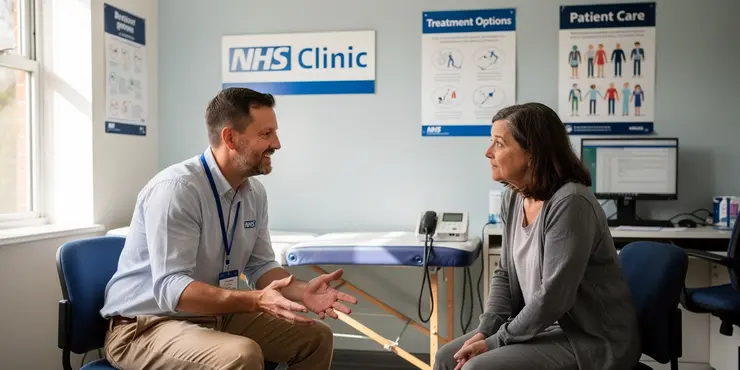
What research is being done on Huntington's disease?
Relevance: 32%
-

What causes Alzheimer's disease?
Relevance: 32%
-

What are the symptoms of Huntington's disease?
Relevance: 30%
-
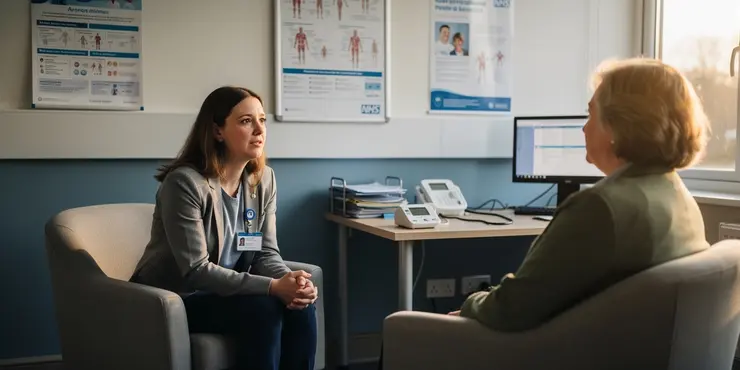
How does dementia progress over time?
Relevance: 29%
-
Can lifestyle changes help with menopause masking?
Relevance: 29%
-

Do lifestyle changes need to accompany Ozempic for weight loss?
Relevance: 29%
-

Can lifestyle changes replace the need for weight loss jabs?
Relevance: 29%
-

Can Huntington's disease be prevented?
Relevance: 29%
-

Can Huntington's disease be cured?
Relevance: 28%
Understanding Motor Neurone Disease
Motor neurone disease (MND), also known as amyotrophic lateral sclerosis (ALS) in some countries, is a progressive neurodegenerative disorder that affects motor neurons in the brain and spinal cord. In the UK, this condition is relatively rare but devastating, leading to muscle weakness, disability, and eventually death. While there is no cure for MND, researchers and healthcare professionals continue to explore various approaches to slow its progression.
The Role of Lifestyle Changes
The question of whether lifestyle changes can impact the progression of MND is an area of active investigation. While conclusive scientific evidence is still developing, certain lifestyle modifications are suggested to potentially enhance quality of life and may also have an effect on disease progression for some individuals.
Dietary Considerations
Nutrition plays a crucial role in general health and may also influence MND. Maintaining a balanced diet that includes antioxidants, vitamins, and minerals is often recommended. Some studies suggest that a high-calorie, high-fat diet might help certain patients maintain weight and energy levels, which is critical since weight loss and muscle wasting are common issues in MND.
Physical Activity
Physical therapy and regular exercise tailored to individual capabilities can help maintain muscle strength and flexibility. While it’s important to avoid overexertion, staying as active as possible is generally encouraged, as it can help reduce stiffness and enhance overall well-being.
Breathing Support
Since MND affects muscles responsible for breathing, respiratory care is a key component of disease management. Non-invasive ventilation (NIV) can improve quality of life and survival. While this is more of a medical intervention than a lifestyle change, using respiratory support techniques at home is part of an adapted lifestyle for those with MND.
Emotional and Mental Well-being
Managing stress and maintaining a positive outlook can potentially impact the progression of MND. Mental health care, including therapy and support groups, may offer emotional support and improve life satisfaction. Mindfulness, meditation, and other stress-reducing practices can also be beneficial.
Challenges and Limitations
While lifestyle modifications may offer some benefits, they cannot replace medical treatment or halt the progression of MND entirely. It's crucial for patients to work closely with their healthcare team to create a comprehensive care plan, which may include medications like riluzole, therapy, and potentially participation in clinical trials.
Conclusion
In summary, while lifestyle changes alone are unlikely to stop MND progression, they can play a supportive role in a holistic approach to care. By focusing on diet, exercise, respiratory support, and mental health, individuals with MND and their caregivers can potentially improve quality of life and possibly influence disease progression to some extent. It's essential to consult healthcare professionals when considering lifestyle modifications and to tailor strategies to the individual's specific needs and condition.
Understanding Motor Neurone Disease
Motor neurone disease (MND) is also called ALS in some places. It is a condition that gets worse over time. It affects the nerves in the brain and spinal cord. In the UK, MND does not happen very often, but it is very serious. It causes muscles to get weak, makes it hard to move, and can lead to death. There is no cure for MND yet, but doctors and scientists are trying to find ways to slow it down.
The Role of Lifestyle Changes
Scientists are studying if changes in how we live can help with MND. We do not know for sure yet, but some changes might make life better and slow down the disease for some people.
Dietary Considerations
What we eat is important for our health and might help with MND. Eating a balanced diet with lots of vitamins and minerals is good. Some research says eating more calories and fats might help people with MND keep their weight and energy. This is important because losing weight and muscle is common in MND.
Physical Activity
Exercise can help keep muscles strong and flexible. It’s important to not do too much, but staying active can help reduce stiffness and make people feel better overall.
Breathing Support
MND can make it hard to breathe. Breathing support is important for people with MND. Machines that help with breathing can make life better and longer. Using these at home is part of life changes for people with MND.
Emotional and Mental Well-being
Feeling happy and not too stressed is important for people with MND. Talking to a therapist and joining support groups can help. Doing activities that reduce stress, like meditation, can also be helpful.
Challenges and Limitations
While lifestyle changes can help, they cannot replace medicine or stop MND completely. People with MND should work with their healthcare team. This team can help make a plan that includes medicine, therapy, and maybe joining research studies.
Conclusion
In short, lifestyle changes alone cannot stop MND, but they can help improve life quality. Focusing on diet, exercise, breathing help, and mental health can make life better for people with MND. It is important to talk to doctors when thinking about lifestyle changes and to do what works best for each person.
Frequently Asked Questions
What is motor neurone disease (MND)?
Motor neurone disease (MND) is a progressive neurological disorder that affects the motor neurons, leading to muscle weakness and atrophy.
Can lifestyle changes impact the progression of motor neurone disease?
Lifestyle changes may help manage symptoms and improve quality of life but are unlikely to alter the disease progression significantly.
What role does diet play in managing MND?
A balanced diet can help maintain overall health, manage symptoms, and prevent malnutrition in individuals with MND.
Is regular exercise beneficial for individuals with MND?
Light to moderate exercise may help maintain muscle function and improve well-being but should be approached with caution and under medical guidance.
Can stress management techniques impact MND progression?
Stress management techniques may improve quality of life and emotional well-being, though they do not affect the underlying progression of MND.
Is quitting smoking important for people with MND?
Yes, quitting smoking can have overall health benefits and improve respiratory function, which is important for individuals with MND.
Does alcohol consumption affect MND progression?
Limiting alcohol consumption is advisable as excessive drinking can negatively impact muscle control and overall health.
Are there any supplements that can help with MND?
Some supplements may assist in managing symptoms or improving nutritional intake, but there is no strong evidence to suggest they change disease progression.
How important is hydration for someone with MND?
Proper hydration is crucial in maintaining health and aiding in the management of symptoms related to MND.
Can improving sleep habits influence MND progression?
Better sleep may enhance quality of life and energy levels but does not directly affect the progression of MND.
What is the impact of social support on MND management?
Social support plays a crucial role in emotional well-being and can help manage the psychological impact of living with MND.
Can alternative therapies help with MND?
Alternative therapies might help with symptom relief and emotional support, but they do not alter the progression of the disease.
Does maintaining a healthy weight help people with MND?
Keeping a healthy weight can support overall health and reduce complications in individuals with MND.
What is the significance of regular medical check-ups for someone with MND?
Regular check-ups are important to monitor progression, manage symptoms, and adjust treatments accordingly.
Can modifying the home environment assist in managing MND?
Yes, adapting the home environment can improve safety and accessibility, making daily activities easier for those with MND.
Does occupational therapy benefit people with MND?
Occupational therapy can provide strategies and tools to maintain independence and quality of life.
What is the role of respiratory care in MND management?
Respiratory care is crucial as MND can affect breathing muscles, and maintaining respiratory health is vital for quality of life.
How can speech therapy help someone with MND?
Speech therapy can help maintain communication abilities and manage swallowing difficulties in individuals with MND.
Is there any evidence that mindfulness practices are beneficial for MND?
Mindfulness can provide stress relief and improve mental health, contributing to a better quality of life.
How does counseling or psychological support assist individuals with MND?
Counseling provides an outlet for dealing with emotional challenges and can improve coping strategies for both patients and their families.
What is motor neurone disease (MND)?
Motor neurone disease is a sickness that affects the nerves in your brain and spine. These nerves help your muscles move.
When you have MND, these nerves stop working. This makes it hard to move your muscles.
People with MND may need help walking, talking, or breathing.
Doctors and therapists can help make things easier for people with MND. They might use special tools to support them.
Motor neurone disease (MND) is a serious illness. It affects the parts of the body that help muscles move. This can make muscles weak and smaller.
Can Changing How You Live Help with Motor Neurone Disease?
Motor Neurone Disease (MND) is a sickness that affects nerves in the body. This can make muscles weak. People with MND often wonder if eating well, exercising, or other changes can help.
Eating healthy food: Eating fruits, vegetables, and other good foods might help you feel better and have more energy.
Exercise: Gentle exercises like walking can help keep your muscles moving. It is important not to do too much.
Rest: Getting enough sleep and rest is very important. It helps your body feel stronger.
Talk to a doctor: Always talk to your doctor or a nurse. They can help you find the best ways to take care of yourself.
Using support tools like apps that remind you to eat or exercise can be helpful. Talking to friends or family for support can also make things easier.
Changing things in your life can help you feel better. It can make your days better too. But it might not stop the disease from getting worse.
How does food help people with MND?
Eating the right foods can help people with MND.
It gives them energy and keeps them strong.
Some foods might be easier to swallow than others.
Doctors and diet experts can help choose the best foods.
Eating different kinds of healthy foods can help people with MND feel better and stay healthy. It stops them from not getting enough nutrients.
Is exercise good for people with MND?
MND is a health problem called Motor Neurone Disease. It makes muscles weak.
Exercise can be helpful for people with MND. It can make muscles stronger and help people feel better.
But it's important to be safe. If you have MND, talk to a doctor before starting exercise.
Some helpful tools:
- Ask a physiotherapist. They know a lot about safe exercises.
- Use simple exercises. Gentle stretching or walking can be good.
- Take breaks and don't get too tired.
Doing light or moderate exercise can help keep your muscles working well and make you feel better. But it's important to be careful and talk to a doctor before starting.
Can stress management techniques impact MND progression?
MND stands for Motor Neurone Disease. It is a disease that affects nerves in the body.
Stress management means finding ways to feel less worried or anxious. This can help you feel better.
Some people want to know if feeling less stressed can help with MND. It is important to ask your doctor about this. They can give the best advice.
Here are some ways to manage stress:
- Take deep breaths. Breathe in and out slowly.
- Listen to calming music.
- Talk to someone you trust about your feelings.
- Try drawing, writing, or another fun activity.
These tools can help you feel calmer and happier.
Ways to handle stress can make life better and help you feel happier. But, they don't change how MND gets worse over time.
Is it important for people with MND to stop smoking?
Smoking is not healthy. It is even more important for people with MND to stop smoking. MND is a sickness that makes your muscles weak. Smoking can make it worse. If you stop smoking, you might feel better. It’s good for your health. **Support Tips:** - Ask a doctor or nurse for help. - Use special kits or patches to stop smoking. - Talk to someone who can help, like a support group. Remember, stopping smoking helps your body stay stronger.Yes, stopping smoking is good for your health. It helps you breathe better. This is really important if you have MND (a type of illness).
To make reading easier, you can:
- Use a reading ruler or finger to follow the words.
- Read out loud slowly.
- Ask someone to explain anything you don’t understand.
Does drinking alcohol change how MND gets worse?
MND is a disease that makes muscles weak and hard to move. If you have MND, you might wonder if drinking alcohol makes it worse.
Here are some ways to help you understand:
- Ask your doctor or nurse about alcohol and MND.
- Read simple guides about MND and alcohol.
- Use apps that read text out loud.
Remember, everyone is different. What you should do depends on you, so it's important to talk to an expert.
It's a good idea to drink less alcohol because too much can make it hard to control your muscles and can hurt your health.
Can vitamins or pills help with MND?
Some supplements can help with symptoms or give extra nutrition, but they do not change how a disease gets worse or better.
Why is drinking water important for someone with MND?
Drinking water is very important for people with MND (Motor Neurone Disease). It helps in many ways:
- Keeps the body working well.
- Makes it easier to swallow food.
- Stops you from feeling tired or dizzy.
- Helps you feel better every day.
To remember to drink enough water, you can:
- Use a special cup or straw to drink easily.
- Ask for reminders to drink, like setting a timer.
- Try drinking small amounts often if big drinks are hard.
Drinking enough water helps you stay healthy when you have MND.
Drinking enough water is very important. It helps you stay healthy and feel better if you have MND (Motor Neurone Disease).
Can better sleep habits help with MND?
Could getting more good sleep help slow down MND? MND stands for Motor Neurone Disease.
- Try to sleep well every night.
- Go to bed and wake up at the same time every day.
- Keep the bedroom quiet and dark.
- Limit screen time before bed.
These tips might help you sleep better. It's always good to talk to a doctor for more advice.
Sleeping well can help you feel better and have more energy. But, it does not change how MND (Motor Neurone Disease) gets worse.
How does having people to help affect caring for MND?
When people help and support someone with MND (Motor Neurone Disease), it can make a big difference. Support from family, friends, and helpers means the person does not feel alone. They can get help with daily tasks and feel loved. This can make handling MND a bit easier.
Tools like picture boards or talking apps can help people with MND communicate better. Joining groups where everyone talks about their feelings can also be good.
Having people around to help and support is very important. It can make us feel better and help us cope with feelings when living with MND.
Can other types of treatments help with MND?
MND stands for Motor Neurone Disease. It is an illness that affects the muscles.
Some people try other types of treatments to feel better. These are called alternative therapies.
Examples of alternative therapies are yoga, massage, or acupuncture.
These treatments might not cure MND, but they can help people feel more relaxed and comfortable.
It's important to talk to a doctor before trying any new treatments.
Tools like pictures or videos can help understand more about these therapies.
Some treatments can help you feel better and support your feelings, but they do not change how the disease works in your body.
Can keeping a healthy weight help people with MND?
MND is a disease that makes muscles weak. It is very important to stay healthy if you have MND.
Keeping a healthy weight can help you feel better and stronger. Eating good food and staying the right weight can help your body fight the illness.
Here are some tips to help you keep a healthy weight:
- Eat small meals often, instead of a few big ones.
- Try to eat foods that are easy to chew and swallow.
- Ask for help from a doctor or dietitian to plan meals.
- Use special tools like cups with lids or plates with edges to make eating easier.
If you or someone you know has trouble reading, using books with big letters or listening to audio books can help. You can also ask someone to read with you.
Staying at a healthy weight helps people with MND feel better and have fewer health problems.
Why are regular doctor visits important for someone with MND?
People with MND should visit the doctor often. This helps the doctor see how the person is doing. It is important for the doctor to check for any changes or problems. Regular visits help the person stay as healthy as possible.
Here are some things that can help:
- Bring a friend or family member to the visit for support.
- Write down questions you have before going to the doctor.
- Use pictures or drawings to talk about how you feel.
It is important to go to the doctor regularly. This helps the doctor see how you are doing, helps with any problems you might have, and changes any medicines if you need it.
Can changing the home help people with MND?
MND stands for Motor Neurone Disease. It is a sickness that affects nerves in the body. It makes muscles weak. Changing things at home can help people with MND. This can make it easier and safer for them to move around.
These are some things that might help:
- Use handrails: Put handrails in hallways and bathrooms. This helps with walking and balance.
- Remove clutter: Keep floors clear of things. This can stop falls and trips.
- Use ramps: Ramps can help if someone uses a wheelchair.
- Furniture: Make sure chairs and beds are easy to get in and out of.
- Ask for help: Talk to a doctor or therapist about more ways to make home better for MND.
Tools like voice assistants can help turn on lights or call for help.
If you help someone with MND, ask them what they find hard and change things to help them.
Yes, changing things at home can make it safer and easier for people with MND to do things every day.
Here are some things that can help:
- Have ramps instead of steps.
- Use grab bars in the bathroom.
- Get chairs and beds that move up and down.
Can occupational therapy help people with MND?
Occupational therapy can help people with MND. It teaches new ways to do everyday activities.
MND stands for Motor Neuron Disease. It affects nerves in the body, making it hard to move or do things.
Occupational therapists help by showing tools to make life easier, like special forks or cups.
They can also suggest exercises to stay strong. This can make daily life better and safer.
For more help, talk to a doctor or an occupational therapist.
Occupational therapy is help that can give you tools and ways to stay independent. It helps you live well and do things by yourself.
What does breathing care do to help people with MND?
Breathing care helps people with MND breathe better.
People with MND might find it hard to breathe on their own.
Special machines and exercises can help.
These tools make it easier to get air in and out of the lungs.
Ask a doctor or nurse if you need help with breathing.
Taking care of your breathing is very important. If you have MND, your breathing muscles might get weak. It is important to keep your breathing healthy to feel good and live well.
How can talking therapy help someone with MND?
Talking therapy can help people who have MND. MND stands for Motor Neurone Disease. It is a disease that makes it hard to move, talk, or swallow.
Here is what talking therapy can do:
- Help with talking: A therapist can show you ways to make talking easier.
- Help with swallowing: They can also teach you how to swallow better and more safely.
- Tools for talking: You might learn to use special tools that help you speak, like computers or apps.
- Practice: You'll get to practice talking and swallowing in a safe way.
It can be helpful to have a family member or friend come with you. They can listen and learn too!
Talking therapy can help people with MND keep talking and eating safely.
Can mindfulness help people with MND?
Mindfulness is a way of thinking that helps you focus on the present moment.
There is some evidence that mindfulness can help people feel better.
MND stands for Motor Neurone Disease. It is a condition that affects the nerves and muscles.
Some people with MND try mindfulness to help them relax and feel calm.
If you want to try mindfulness, you can use apps, watch videos, or listen to audio guides.
Always talk to a doctor or health professional before starting any new health practices.
Mindfulness can help you feel less stressed and make your mental health better. This can make your life happier.
How can talking to a counselor or therapist help people with MND?
Talking to someone can help when you have MND. A counselor or therapist is a person who listens to you. They can help you feel better and less worried.
If you have MND, it's okay to feel sad or scared. The counselor can teach you ways to feel calm and happy.
Here are some tools that might help:
- Talking: Share your thoughts and feelings with someone you trust.
- Relaxation exercises: Learn to breathe deeply or think of happy places.
- Keeping a diary: Write down your feelings and what happens each day.
These things can make you feel better and help you manage your feelings.
Talking to a counselor can help you deal with big feelings. It can also help you and your family learn new ways to handle tough times.
Useful Links
This website offers general information and is not a substitute for professional advice.
Always seek guidance from qualified professionals.
If you have any medical concerns or need urgent help, contact a healthcare professional or emergency services immediately.
Some of this content was generated with AI assistance. We’ve done our best to keep it accurate, helpful, and human-friendly.
- Ergsy carfully checks the information in the videos we provide here.
- Videos shown by Youtube after a video has completed, have NOT been reviewed by ERGSY.
- To view, click the arrow in centre of video.
- Most of the videos you find here will have subtitles and/or closed captions available.
- You may need to turn these on, and choose your preferred language.
- Go to the video you'd like to watch.
- If closed captions (CC) are available, settings will be visible on the bottom right of the video player.
- To turn on Captions, click settings .
- To turn off Captions, click settings again.
More Items From Ergsy search
-
Can lifestyle changes impact motor neurone disease progression?
Relevance: 100%
-

What is motor neurone disease?
Relevance: 83%
-
Is motor neurone disease hereditary?
Relevance: 80%
-
Are there different types of motor neurone disease?
Relevance: 80%
-

Is there a cure for motor neurone disease?
Relevance: 79%
-

What causes motor neurone disease?
Relevance: 78%
-

What are the primary symptoms of motor neurone disease?
Relevance: 76%
-

How is breathing affected by motor neurone disease?
Relevance: 72%
-

What treatments are available for motor neurone disease?
Relevance: 69%
-

Motor neurone disease Julie's story | NHS
Relevance: 69%
-

How is motor neurone disease diagnosed?
Relevance: 69%
-

How does motor neurone disease affect the body?
Relevance: 69%
-

What role do genetics play in motor neurone disease?
Relevance: 69%
-
How does motor neurone disease affect speech?
Relevance: 68%
-

What assistive devices can help people with motor neurone disease?
Relevance: 67%
-

How does motor neurone disease impact swallowing?
Relevance: 65%
-

What is the life expectancy after a motor neurone disease diagnosis?
Relevance: 65%
-

Voice banking service helps people live with motor neurone disease
Relevance: 59%
-

How can caregivers support someone with motor neurone disease?
Relevance: 59%
-

Are there support groups for individuals with motor neurone disease?
Relevance: 50%
-

Who is at risk for motor neurone disease?
Relevance: 50%
-

What research is being done on motor neurone disease?
Relevance: 50%
-

Can lifestyle changes help manage Huntington's disease?
Relevance: 41%
-

Can lifestyle changes reduce the need for medication for heart disease prevention?
Relevance: 40%
-

What is MND?
Relevance: 38%
-
What is Parkinson's disease?
Relevance: 38%
-
How does Huntington's disease affect movement?
Relevance: 38%
-

What causes Huntington's disease?
Relevance: 37%
-

Is Huntington's disease fatal?
Relevance: 34%
-
How quickly does flesh-eating disease progress?
Relevance: 33%
-

What is the typical progression of Marburg virus disease?
Relevance: 33%
-

What research is being done on Huntington's disease?
Relevance: 32%
-

What causes Alzheimer's disease?
Relevance: 32%
-

What are the symptoms of Huntington's disease?
Relevance: 30%
-

How does dementia progress over time?
Relevance: 29%
-
Can lifestyle changes help with menopause masking?
Relevance: 29%
-

Do lifestyle changes need to accompany Ozempic for weight loss?
Relevance: 29%
-

Can lifestyle changes replace the need for weight loss jabs?
Relevance: 29%
-

Can Huntington's disease be prevented?
Relevance: 29%
-

Can Huntington's disease be cured?
Relevance: 28%


